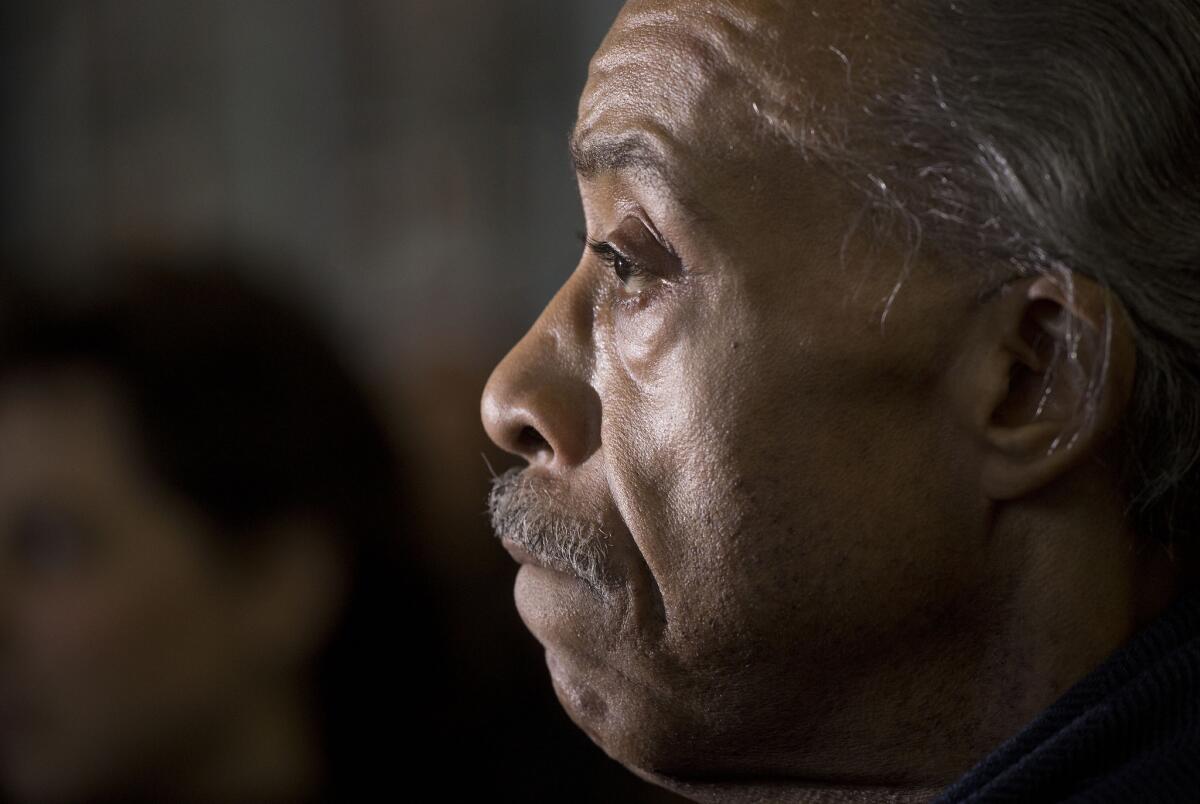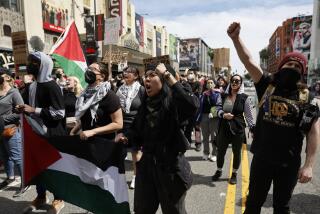Al Sharpton slams Hollywood: ‘We cannot have the face of American culture exclude us’

The Rev. Al Sharpton, shown earlier this month, on Sunday delivered a sermon in Los Angeles in which he spoke about the lack of diversity in the film industry.
- Share via
The Rev. Al Sharpton spoke in front of a packed house at the First AME Church of Los Angeles on Sunday, saying he planned “to start a movement” to draw attention to the lack of diversity among this year’s Oscar nominees.
“In 2016, a year when we saw movies like Idris Elba’s ‘Beasts of No Nation,’ movies like ‘Straight Outta Compton,’ and movies like ‘Concussion,’ not one of these actors and actresses of color was nominated for their roles,” Sharpton said at the church’s 10 a.m. service. “There are no blacks who can greenlight a film. We can put a black family in the White House, but we can’t put a black in the boardroom of power in Hollywood.”
His comments drew applause and chants of approval from the black congregation, who had invited him to speak as part of the church’s 144th-anniversary celebration.
Sharpton said his issue was not with the artists who star in and make films, but rather with Hollywood’s decision makers.
“This is about the industry,” he said. “We cannot have the face of American culture exclude us.”
The reverend then turned to black comedian Chris Rock, the host of the 88th Academy Awards.
“People ask me, ‘What about Chris Rock, aren’t you friends?’” Sharpton said. “I say yes, ‘He tells jokes. I tell the truth. We get along fine.’”
This drew more applause and chants from the congregation.
After the service, Sharpton held a news conference to discuss a rally he planned to hold Sunday afternoon at Highland Avenue and Sunset Boulevard, just a few blocks from the Dolby Theatre, where the Academy Awards were to be held. Many of the celebrities attending the ceremony would pass by the busy intersection.
#OscarsSoWhite: Full coverage of the boycott and Hollywood’s reaction
The news conference took place on the grounds of a mansion next to the former home of Hattie McDaniel, the first African American to win an Oscar. She received the award in 1940 for her role as Mammy in “Gone With the Wind.”
In addition to the protest in Los Angeles, Sharpton said his group, the National Action Network, had organized rallies in other cities, including New York, Cleveland, Atlanta and Detroit.
“These gatherings are to put the industry on notice,” he said. “The ceremony may go on tonight, but we are starting today to make sure this will not happen again under these circumstances.”
He held up an Oscar statuette that had been painted white to make his point.
“When they present the awards tonight, they ought to present them as they are,” he said. “White Oscars.”
In 2012, The Times reported that Oscar voters were 94% white and 77% male. Four years later, the academy has made scant progress: Oscar voters are 91% white and 76% male, according to a new Times study.
Blacks are about 3% of the academy, up from 2%; Asians and Latinos each make up just over 2%, with both groups up slightly.
The academy has invited more women and minority group members over the last four years, but with its 6,261 voting members appointed for life, the organization’s ranks are on track to remain overwhelmingly white and male for decades.
Under fire for nominating an all-white slate of actors for two years in a row, the academy last month vowed to double the number of women and minority members by 2020. It also adopted controversial new rules that will allow it to take away voting rights from inactive members.
“Our goal is to make sure that we are active in bringing in different voices regardless of gender or race or sexual orientation,” academy President Cheryl Boone Isaacs said in an interview Thursday. “Inclusiveness in this organization, that is our goal.”
Sharpton said that after two consecutive years of no black Oscar nominees, he hopes to see change in 2017.
“This will escalate into a mass movement next year if this is not corrected,” he said.
For more Los Angeles news, follow @sjceasar
ALSO
Steve Lopez: Why Donald Trump will never win over L.A.’s Latino voters
Ku Klux Klan rally in Anaheim erupts in violence; three stabbed, 13 arrested
The Ku Klux Klan’s ugly, violent history in Anaheim
More to Read
Sign up for Essential California
The most important California stories and recommendations in your inbox every morning.
You may occasionally receive promotional content from the Los Angeles Times.











